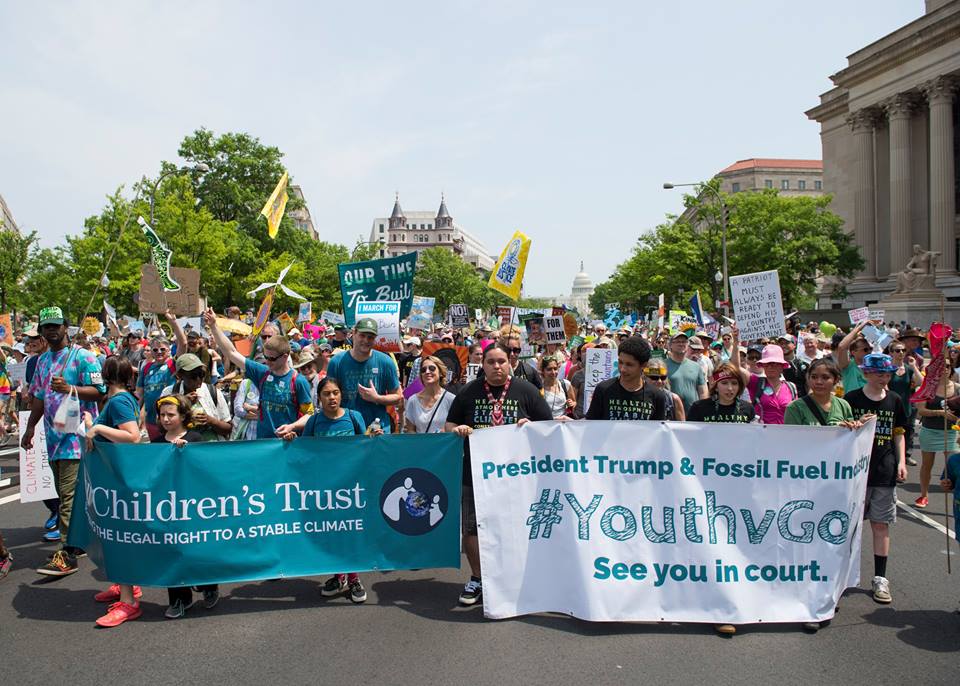The Trump administration has gone to the Supreme Court in an effort to stop a landmark climate case brought against the federal government by 21 children and young adults. The last-ditch effort comes ahead of a court hearing on the case scheduled for Wednesday afternoon.
On Tuesday, Solicitor General Noel Francisco from the Department of Justice (DOJ) asked the Court to block any further legal proceedings in what it calls an “ill-conceived suit” — including Wednesday’s hearing. The government is also seeking to stay discovery and trial in the U.S. District Court of Oregon where the case is scheduled for October.
In what legal experts have called a groundbreaking piece of climate litigation, the lawsuit seeks to hold the federal government accountable for its role in perpetuating climate change. The final decision could shape the future of climate litigation for years to come.
The government is “desperately trying to outrun the justice system,” Erika Lennon, senior attorney at the Center for International Environmental Law, said in an email to ThinkProgress. “The Supreme Court should see this as nothing more than the latest contortion by the Trump Administration to avoid facing these courageous youths in court, deny the government’s request, and allow this case to proceed using the normal judicial process.”
The DOJ’s move comes one day after the Ninth Circuit Court denied the Trump administration’s motion to stay district court proceedings while it considers the government’s latest petition — known as a writ of mandamus — filed earlier in July to have the case thrown out.
This was after the court in March denied a similar attempt by the administration to avoid going to trial. In its decision to deny the government’s first petition against the Ninth Circuit, Chief Judge Sidney Thomas called the administration’s motion to dismiss the case “entirely premature,” arguing the government had failed to reach the “high bar” required for dismissal.
The attempt to have the Supreme Court block the case comes one day before oral arguments are set to be heard in a Federal District Court in Oregon. On Wednesday afternoon, Judge Ann Aiken will hear arguments in the case — the first time defendants and plaintiffs will appear before the judge since 2016.
Attorneys representing the youth plaintiffs, some of the plaintiffs themselves, and attorneys representing the Trump administration will all stand before Judge Aiken. During this time, it is expected that the defendants’ arguments for why this case should be dismissed will be heard.
The fact that the administration went to the Supreme Court on Tuesday, before their arguments for dismissal were heard on Wednesday, “shows you the level of confidence they have in their own motions,” Philip Gregory, co-lead counsel for the youth plaintiffs, told ThinkProgress.
Gregory “absolutely” expects the administration’s attorneys to show up to Wednesday’s oral arguments. It’s unclear when the judge will issue a decision, but Gregory expects Judge Aiken will follow her past decisions and allow the case the move forward.
The climate lawsuit, brought by nonprofit organization Our Children’s Trust, was first filed in August 2015 against the Obama administration. In January 2017, the Trump administration was named as a defendant in the case.
The lawsuit uses a legal theory known as atmospheric trust litigation, which argues the government must hold certain common elements such as rivers or shorelines, and in this case, the atmosphere, for public use. By failing to protect and preserve a clean atmosphere for future generations — by promoting fossil fuels, for instance — the lawsuit argues that the government is violating its obligation to the public trust.
Since it was first introduced nearly three years ago, the case has survived numerous attempts by government to have it dismissed.
Before it could proceed, however, the Trump administration filed its first writ of mandamus against the Ninth Circuit Court in June 2017. The government’s lawyers said the court should “end this clearly improper attempt to have the judiciary decide important questions of energy and environmental policy to the exclusion of the elected branched of government.”
The court then temporarily paused the proceedings until it could render a decision — which came in March. That decision against the administration’s petition was seen as giving the “green light” to allow the case to finally proceed to trial, according to Julia Olson, co-counsel for the plaintiffs. The trial date has now been set for October 29.
The Trump administration of course could, and did, appeal that decision to the full Ninth Circuit on July 5 and, after that was dismissed, has now taken it one step higher to the Supreme Court.
But as Gregory argues, the administration is “mischaracterizing where we are in this case.”
In the filing to the Supreme Court, the administration is seeking immediate relief from what it argues is an overly burdensome case. It is arguing that the process of discovery — producing documents, witnesses, and so on — is too burdensome on the government, in part because the trial is just three months away. However, no calls for discovery have been issued yet.
“They’re arguing they have these great discovering burdens that only the Supreme Court can relieve them of. That is simply fake news,” said Gregory. “The only thing they have to do on August 12 is produce expert witness reports for their own experts. That’s something any party does in the normal course of litigation.”
“The plaintiffs are preparing for trial and the defendants have done nothing but file motions and petitions seeking to avoid the trial,” Gregory continued. “We’re hoping that the Supreme Court sees through this ruse.”
CLARIFICATION: This article has been updated to clarify that on Monday the Ninth District Court denied the government’s motion to stay district court proceedings while they consider the administration’s July 5 petition to dismiss the case.



